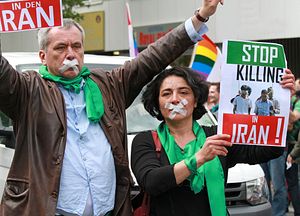Throughout the three years of Hassan Rouhani’s presidency, some in the West have maintained hope that it would herald an era of moderation and reform in Iran. Subsequent to the nuclear deal between Iran and the P5+1, this sentiment was further accentuated by the same people. This is an opportune time to fact check.
There have been over 2,400 executions in Iran in just under three years. Victims include political dissidents, most notably the activists of the People’s Mojahedin Organization of Iran. In a report on March 10, 2016, Ahmed Shaheed, the UN special rapporteur for human rights in Iran, said that executions in Iran had surged to nearly 1,000 in 2015, the highest level in more than a quarter-century. The number of executions in 2015 was roughly double the number executed in 2010 and 10 times as many as were executed in 2005. Amnesty International underscored in its annual report that Iran has the highest number of executions per capita.
This trend continues. The Iranian regime carried out at least 21 hangings in a 48-hour period in the second week of May.
Iran is likely the biggest executor of juvenile offenders. And executions of ethnic and religious minorities have increased dramatically.
Meanwhile, those who are not put to death may be subject to other cruel punishments. Last August, a prisoner in Mashhad had his right hand and left foot amputated as others were forced to watch.
Violent punishments are not confined to Iran’s prisons, either. For instance, in October 2014, gangs affiliated with the regime carried out acid attacks on at least 25 Iranian women and girls who were regarded as being improperly veiled or otherwise in violation of religious norms.
This sort of enforcement of the regime’s ruling ideology has also motivated a massive, ongoing crackdown on activists, writers, bloggers, and artists. This has helped Iran to secure its title as the largest jailer of journalists in the Middle East.
In short, the human rights situation is deteriorating at a fast pace.
Tehran’s nefarious conduct is not limited by the country’s borders. Day by day, Iran is expanding its involvement in the Syrian civil war. It is now evident that if it were not for the Iranian regime’s all-out support for Syrian dictator Bashar al-Assad, he would have been overthrown long ago. The Iranian regime is thus the main cause of continuing carnage in Syria.
The Revolutionary Guards have now dispatched a conglomerate of more than 70,000 troops on the ground, consisting of 10,000 notorious Quds Force members, and tens of thousands of foot-soldiers and mercenaries from Afghanistan, Iraq, Lebanon, and Pakistan. Tehran is so caught in the Syrian quagmire that a brigade of Iran’s regular army was recently dispatched to Syria as well.
On May 13 Iranian Foreign Minister Mohammad Javad Zarif heaped praise on the notorious terror group Hezbollah’s top military commander in Syria, who died in a Damascus explosion.
“I express my condolences on the martyrdom of the great holy fighter Mustafa Badreddine who was full of spirit and heroism in defending the righteous values of Islam and the combatant people of Lebanon,” Zarif said in a message to Hezbollah leaders. This followed Zarif’s previous acts such as laying a wreath at the grave of Imad Mughniyah, the former military commander and head of the terror apparatus of Hezbollah, in 2014. Heaping such praises on notorious international terrorists clearly shows that Zarif regards terrorism as a state tool.
I am no stranger to diplomatic relations. I was one of three senior Iranian diplomats who resigned from our ambassadorships in protest against an unbridled wave of executions in Iran in the early 1980s and joined the National Council of Resistance of Iran, led by Mrs. Maryam Rajavi. Doing so came at great personal cost. Two of us were gunned down in broad daylight in Geneva and in Rome by terrorists dispatched from Tehran, the first in 1990 and the second in 1993. I am the sole survivor.
Despite the persistent danger, I remain active in the NCRI to this day. On July 9, I will travel to Paris to take part in the organization’s “Free Iran” rally, which is expected to draw tens of thousands of people, comprised not only of Iranian exiles but also their supporters from the governments and activist communities of their many host countries to highlight Tehran’s nefarious conduct at home and abroad, calling for a new policy that sides with the Iranian people and their desire for freedom.
Recent Western policies that flirt with appeasement and neglect human rights, putting trade agreements and expanded relations ahead of such issues is totally unacceptable. Human life and safety cannot be made subordinate to short term economic interests.
It is high time for Western countries to take a stance on the dreadful human rights situation in Iran and make any improvement of relations with Tehran and any trade ties conditional upon improvement of the human rights situation in Iran, including an immediate halt to executions in that country.
Perviz Khazaii is the former Ambassador of Iran in Sweden and Norway and the representative of the National Council of Resistance of Iran in Nordic countries.

































